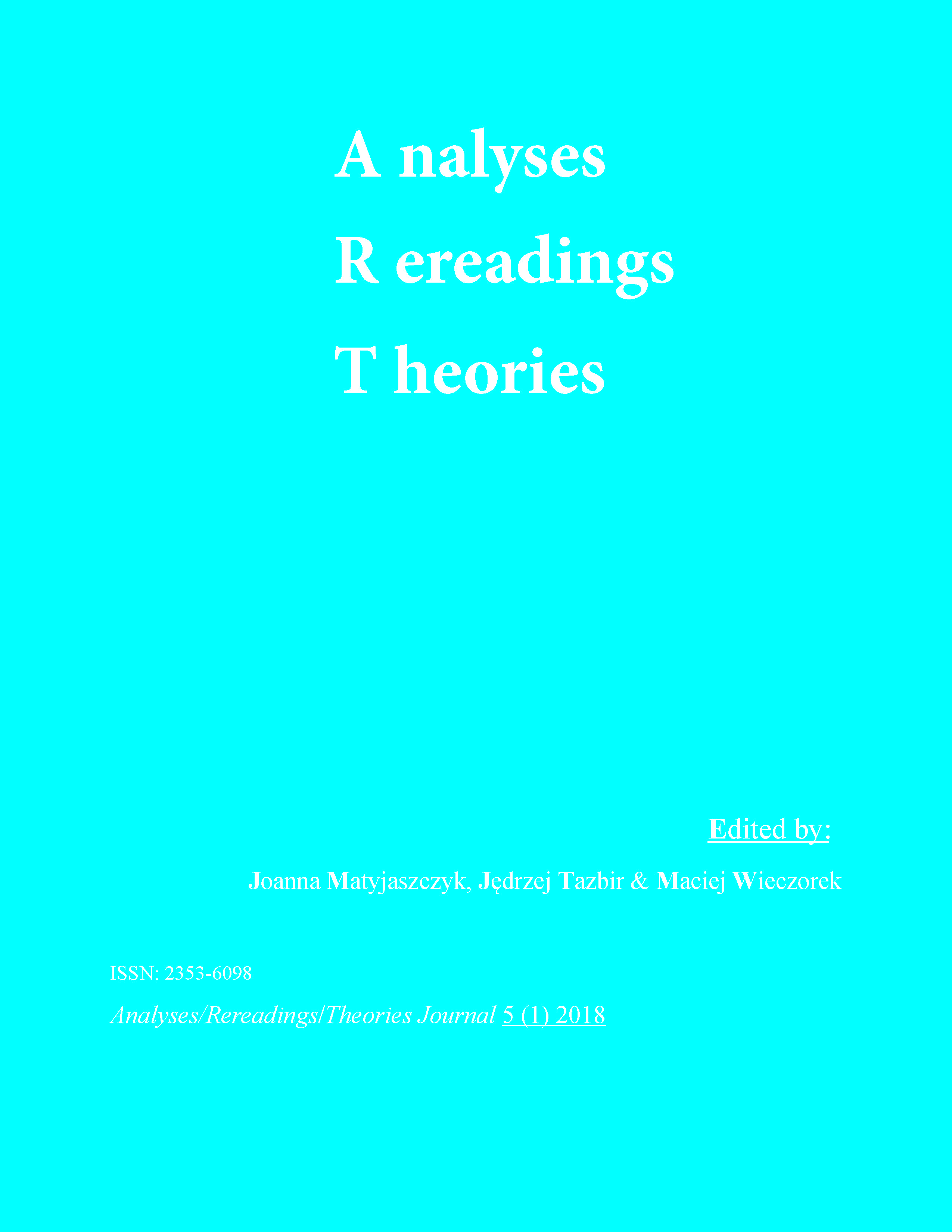Drunken Language, Elliptical Politics: Caryl Churchill’s Oblique Protest Theatre
Keywords:
political theatre, war on terror, Caryl Churchill, British theatre, Iraq warAbstract
Can “political theatre” exist in today’s political climate? In the last few decades, our understanding of politics and theatre has undermined the basis on which prior generations of artists conceived of both politics and theatre. Caryl Churchill’s Drunk Enough to Say I Love You? sits at the intersection of critiques of dramatic theatre and new forms of post-dramatic, non-representational performance. The play tells the story of a man, Guy, who falls in love with a country, Sam, and critics have largely seen the play as an allegory for the “special relationship” between Britain and the United States. But while the play riffs on that metaphor, it also includes aspects that work against a political reading. Churchill’s depiction of the relationship as a sincere gay love affair raises questions about what it means to say that politicians are “in bed together.” As the play develops, the political critique and the personal relationships seem to work against each other, and the play becomes an elliptical invitation to think political theatre anew.
References
Adiseshiah, Siân. “Political Returns on the Twenty-First Century Stage: Caryl Churchill’s Far Away, Drunk Enough to Say I Love You? and Seven Jewish Children.” C21 Literature: Journal of 21st-Century Writings 1.1 (2012): 99–117.
Google Scholar
Adorno, Theodor W. The Culture Industry: Selected Essays on Mass Culture. Ed. J. M. Bernstein. New York: Routledge, 1991.
Google Scholar
Aston, Elaine and Elin Diamond. “Introduction: on Caryl Churchill.” The Cambridge Companion to Caryl Churchill. Ed. Elaine Aston and Elin Diamond. Cambridge: Cambridge UP, 2009. 1–17.
Google Scholar
Benjamin, Walter. “The Work of Art in the Age of Mechanical Reproduction.” Illuminations. Trans. Harry Zohn. New York: Harcourt, 1968. 217–52.
Google Scholar
Biber, Yeliz. Rev. of Drunk Enough to Say I Love You? By Caryl Churchill. Interactions 17.1 (2008): 149–52. 22 Mar. 2008. Web. 12 Nov. 2018.
Google Scholar
Billington, Michael. Rev. of Drunk Enough to Say I Love You? Royal Court, London. The Guardian, 23 Nov. 2006. Web. 12 Nov. 2018.
Google Scholar
Brantley, Ben. “They Don’t Call It a Special Relationship for Nothing.” Rev. of Drunk Enough to Say I Love You? By Caryl Churchill. The New York Times, 17 Mar. 2008. Web. 12 Nov. 2018.
Google Scholar
“bush blair endless love.” Music video for “Endless Love” by Lionel Richie and Diana Ross. YouTube, uploaded by siegharuto, 10 Nov. 2005. Web. 12 Nov. 2018.
Google Scholar
Churchill, Caryl. Drunk Enough to Say I Love You? London: Theatre Communications Group, 2008.
Google Scholar
Churchill, Caryl. Far Away. London: Nick Hern Books, 2003.
Google Scholar
Churchill, Caryl. “Iraq.doc.” War Correspondence. Caryl Churchill, Martin Crimp, Rebecca Prichard, April De Angelis, Elyse Dodgson and Indhu Rubasingham. Royal Court Theatre, London, 7 Apr. 2003. Performance.
Google Scholar
Diamond, Elin. Unmaking Mimesis: Essays on Feminism and Theater. New York: Routledge, 1997.
Google Scholar
Edgar, David. “Playwright David Edgar on the Rise of a Vibrant Theatre of Reportage.” The Guardian, 26 Sept. 2008. Web. 12 Nov. 2018.
Google Scholar
Féral, Josette. “Theatricality: The Specificity of Theatrical Language.” Trans. Ronald P. Bermingham. SubStance 31.2 (2002): 94–108.
Google Scholar
Foucault, Michel. The Order of Things: An Archaeology of the Human Sciences. Trans. Alan Sheridan. New York: Routledge, 2002.
Google Scholar
“Gay Bar.” Music by Electric Six. YouTube, uploaded by stray 13, 22 Jun. 2006. Web. 12 Nov. 2018.
Google Scholar
Gobert, R. Darren. The Theatre of Caryl Churchill. New York: Methuen, 2014.
Google Scholar
Hopps, H. R. “Destroy This Mad Brute—Enlist.” 1917. Imperial War Museum. Web. 12 Nov. 2018.
Google Scholar
Karabekir, Jale. “Drunk Enough to Say I Love You? (Seni Seviyorum Diyecek Kadar Sarhos?).” YouTube, uploaded by JaleKarabekir, 1 Feb. 2010. Web. 12 Nov. 2018.
Google Scholar
Kershaw, Baz. The Radical in Performance: Between Brecht and Baudrillard. New York: Routledge, 1999.
Google Scholar
Kritzer, Amelia Howe. “America as Rogue State Caryl Churchill’s Drunk Enough to Say I Love You?” Political and Protest Theatre After 9/11: Patriotic Dissent. Ed. Jenny Spencer. New York: Routledge, 2012. 53–62.
Google Scholar
Kritzer, Amelia Howe. Political Theatre in Post-Thatcher Britain: New Writing: 1995–2005. New York: Palgrave Macmillan, 2008.
Google Scholar
Lehmann, Hans-Thies. Postdramatic Theatre. Trans. Karen Jürs-Munby. New York: Routledge, 2006.
Google Scholar
“Make Love Not War.” Daily Mirror, 14 Feb. 2003. Web. 12 Nov. 2018.
Google Scholar
Rebellato, Dan. “The Personal Is Not Political: Caryl Churchill’s Drunk Enough to Say I Love You?” Western European Stages 19.1 (2007): 33–48.
Google Scholar
Stevens, Lara. Anti-War Theatre After Brecht: Dialectical Aesthetics in the Twenty-First Century. New York: Palgrave Macmillan, 2016.
Google Scholar
Downloads
Published
How to Cite
Issue
Section
License

This work is licensed under a Creative Commons Attribution-NonCommercial-NoDerivatives 4.0 International License.





